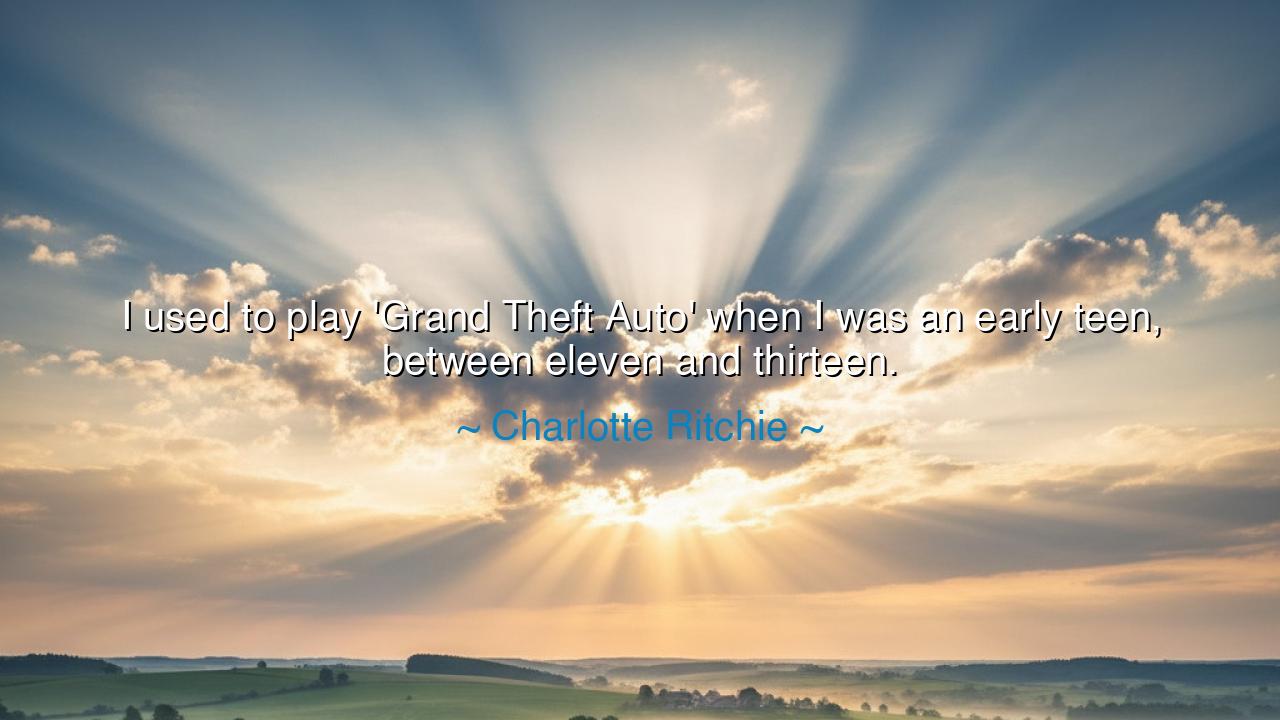
I used to play 'Grand Theft Auto' when I was an early teen
I used to play 'Grand Theft Auto' when I was an early teen, between eleven and thirteen.






Hearken, O children of the ages, to the words of Charlotte Ritchie, who speaks of her youthful engagement with the digital realm: “I used to play ‘Grand Theft Auto’ when I was an early teen, between eleven and thirteen.” In this simple declaration lies a profound reflection upon the landscape of adolescence, where play, imagination, and exploration intersect with curiosity, morality, and self-discovery. Even the most modern forms of entertainment carry echoes of ancient truths: through engagement with challenge and consequence, the young mind learns, tests boundaries, and exercises judgment.
Since antiquity, the youth have sought outlets to explore the edges of experience. In the amphitheaters of Greece, adolescents observed the dramas of gods and mortals, learning from their triumphs and transgressions. In medieval training grounds, young warriors tested skill, courage, and strategy within controlled arenas. Ritchie’s reflection mirrors these timeless practices: though the medium is digital, video games such as Grand Theft Auto serve as arenas for experimentation, decision-making, and the rehearsal of consequence in a space that is safe yet immersive.
Consider the story of Niccolò Machiavelli, who, in his youth, observed the intrigues, power struggles, and moral ambiguities of Florence. Though not engaged in combat himself, he analyzed strategy, choice, and consequence, developing insights that would shape his understanding of governance and human behavior. Similarly, Ritchie’s engagement with games allowed for the rehearsal of judgment, understanding of societal structures, and recognition of cause and effect, preparing the mind for reflection upon the wider world.
Her reflection also illuminates the nature of early adolescence, a period of rapid growth, identity formation, and boundary-testing. Between eleven and thirteen, the young person experiences newfound freedom and responsibility, yet remains in need of guidance. Engagement with games—whether digital, physical, or narrative—is not mere diversion; it is an exploration of autonomy, ethics, and skill. Ancient philosophers recognized such play as essential to developing discernment, courage, and strategic thinking.
The lesson is profound: engagement with imaginative, challenging, or morally complex scenarios fosters growth. The experience of play, even within virtual worlds, teaches decision-making, consequences, and reflection upon choice. By observing outcomes, testing strategies, and exploring possibilities in a safe arena, youth develop skills that endure, forming the foundation for critical thinking and self-awareness.
Practical guidance emerges from this insight. Encourage thoughtful engagement with games and narratives, discussing the consequences, ethics, and strategies they present. Balance time spent in exploration with reflection, creativity, and real-world responsibilities. Recognize that even seemingly fantastical or morally ambiguous scenarios can teach resilience, problem-solving, and ethical reasoning, when approached with intention and awareness.
Charlotte Ritchie’s words also remind us of the importance of context and moderation. The experiences of early adolescence are formative, and guidance from elders, mentors, and peers ensures that exploration is constructive rather than destructive. Whether through games, literature, or art, the young mind benefits from reflection, discussion, and connection, turning playful engagement into lasting insight and wisdom.
Thus, heed the eternal teaching of Charlotte Ritchie: the engagement of the early teen with challenging, immersive experiences—whether digital, narrative, or imaginative—is a rehearsal for life. Through play, choice, and reflection, one cultivates judgment, discernment, and creativity. Embrace such opportunities wisely, balancing curiosity with guidance, and allow the lessons of exploration to illuminate the path of growth, understanding, and human flourishing.






AAdministratorAdministrator
Welcome, honored guests. Please leave a comment, we will respond soon